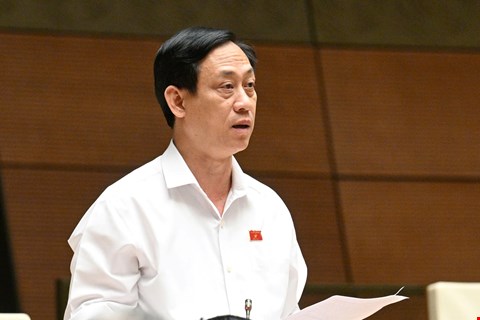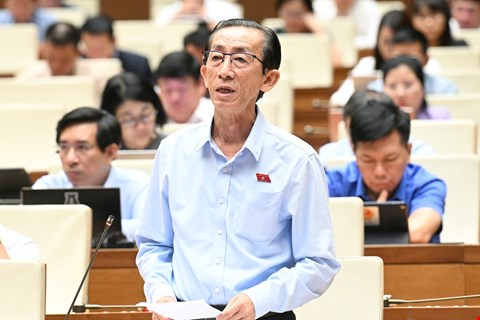On the morning of May 26, the National Assembly discussed the draft State Budget Law (amended).
Participating in giving comments, delegate Mai Van Hai - Deputy Head of the National Assembly Delegation of Thanh Hoa province basically agreed with the submission and report on the review of the draft Law.
However, the delegate expressed concern about the regulation on dividing revenue from land tax to the central budget and suggested reviewing.

Accordingly, the draft proposes to change the way of dividing revenue from land use fees and land rents. Instead of letting localities enjoy the entire budget as it is now, the draft law stipulates that localities that cannot balance their own budgets will only enjoy 70%, 30% of the central budget.
Regarding this content, the delegate suggested that land use fees and land taxes should be paid to localities at 100%, and should not be divided to the central budget.
The delegate said that when local authorities at both levels come into operation on a large scale, new development space needs to be invested in with many resources for infrastructure, economy, science and society.
Meanwhile, when rearranging administrative units, new administrative units, especially communes in rural areas, mountainous areas, border areas, and islands, will still have many budget difficulties that must depend on the balance from the superior budget. The provinces also really need budgets to invest in socio-economic development in new administrative units.
Delegate Nguyen Thanh Nam - Phu Tho National Assembly Delegation said that for the immediate future, for localities that have not yet balanced their budgets, the land use fee collection will remain the local budget revenue receiving 100%.
The delegate suggested assigning the Government to specify in detail to suit the actual situation of each locality after the arrangement and merger in each specific period to ensure proactive flexibility.

Also assessing the above land tax division plan, delegate Tran Hoang Ngan - National Assembly Delegate of Ho Chi Minh City said that it was not suitable. The delegate suggested that it is necessary to continue to maintain current regulations to achieve the double-digit growth target, promote local potential when merging, merging, and expanding development space.
Giving evidence, delegate Tran Hoang Ngan said that in Ho Chi Minh City, to meet the demand for public investment by 2030, the budget capital needed to be mobilized is 1.1 million billion VND. With a revenue from land of VND550,000 billion, but having to regulate 30% to the central budget, meaning a loss of more than VND33,000 billion per year.
Explaining to the National Assembly the opinions raised by delegates, Minister Nguyen Van Thang said that the Ministry of Finance will continue to review and report to the Government to submit to the National Assembly the appropriate ratio of division between the central and local budgets (after deducting land revenue) in 2026.
The draft Law is expected to be voted on on on June 25.











